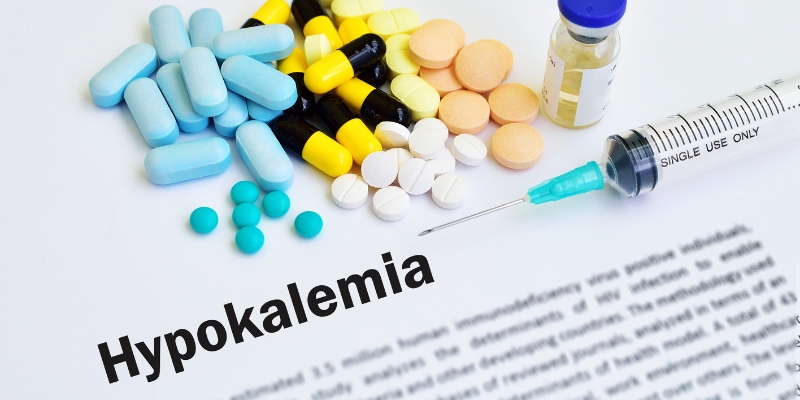
Mineral potassium is essential for biological processes. Hypokalemia occurs when potassium levels dip below normal. Low potassium symptoms must be recognized for early diagnosis and treatment. Muscular weakness is a typical symptom since potassium is needed for muscular function. This weakness may affect many muscle groups and vary from minor to severe.
Fatigue and lethargy are also prevalent because low potassium levels reduce cell energy generation. Hypokalemia may cause leg, arm, and abdominal muscular cramps. These abrupt, intense cramps may disrupt everyday life. In addition, low potassium levels might cause abnormal heartbeats or palpitations. These cardiac symptoms may cause dizziness or fainting. Finally, hypokalemia may cause constipation and other digestive difficulties. Note that these symptoms vary in intensity by person. See a doctor for diagnosis and treatment if you have any of these symptoms.

What is Hypokalemia?
Hypokalemia—an unfamiliar term—has serious health consequences. This disorder involves several variables, not only a potassium reduction—disruptions in blood potassium equilibrium cause hypokalemia. Diet and renal management maintain this homeostasis by conserving or excreting potassium as needed. Hypokalemia may be caused by poor food, drugs, medical problems, or significant potassium loss via vomiting or diarrhea.
Hypokalemia may seem unfamiliar, but it's essential to know. It involves several components, not just a lack. Difficulties with potassium balance in the circulation cause hypokalemia. Diet and kidneys regulate potassium levels to maintain this balance. An insufficient diet, certain drugs, underlying health issues, or significant potassium loss from vomiting or diarrhea may induce hypokalemia. Understanding these details is crucial to understanding this illness.
The Role of Potassium in the Body:
Hypokalemia's gravity is understood by understanding potassium's vital function in our complex physiological tapestry. Potassium is an active participant. From its home in our cells, it controls several processes, including:
Muscle Function:
Potassium controls muscular function. Muscles weaken and spasm when potassium levels drop.
Nerve Cells:
Potassium monitors nerve cells. As an electrical conductor, it transmits impulses smoothly. When potassium drops, nerve impulses become irregular, causing tingling and numbness.
Heart Health:
Potassium regulates cardiac rhythm. Potassium imbalances may cause palpitations and irregular heartbeats.
Blood Pressure:
Potassium controls blood pressure in addition to muscle and nerve function. Balances body sodium levels to exert its effect.
Potassium is essential to our daily lives. From its central position in cells, it controls several biological functions. Its duties are varied:
Muscle Function:
The unsung hero of muscular function is potassium. It guarantees that your muscles obey your orders quickly and consistently. However, low potassium levels may weaken and cramp muscles, making routine actions difficult.
Nerve Cells:
Electrical impulses from nerve cells depend on potassium. Like an orchestra conductor, potassium ensures your nerves send clear, timely information. Nerve impulses may become irregular as potassium levels decline, causing tingling or numbness.
Heart Health:
The heart's constant beat requires potassium. The pacemaker regulates your heartbeat. However, potassium fluctuations may disrupt the heart's electrical circuitry, producing palpitations and irregular heartbeats.
Blood Pressure Regulation:
Potassium affects blood pressure subtly. It combines with salt to maintain optimum blood pressure. When potassium is insufficient, sodium may replace it, raising blood pressure.
Common Symptoms of Low Potassium:
Muscle Weakness and Cramps:
Muscle weakness and cramping indicate hypokalemia. As potassium's muscular function diminishes, even simple activities become difficult, and cramps become common.
Fatigue, weakness:
Low potassium levels cause persistent weariness and weakness. Potassium deficit depletes your energy, leaving you exhausted.
Heart palpitations and irregular heartbeat:
The heart also complains when potassium drops. Damage to potassium's involvement in heart rhythm may cause irregular heartbeats, palpitations, and more severe cardiac issues.
Tingling or Numbness:
When it fails, potassium's role in nerve signaling is highlighted by tingling or numbness in your limbs.
Constipation and Digestive Issues:
Potassium affects the digestive system. Low potassium may slow digestive muscles, causing constipation and other gastrointestinal issues.
Hypokalemia symptoms are the body's warning signs that the deficit must be treated. These symptoms affect several health areas. Recognizing these indications may help you get medical help and regulate your potassium levels.

Diagnosing Hypokalemia:
Contact a doctor immediately if you suspect hypokalemia. Self-diagnosis and therapy are discouraged since underlying medical disorders might mimic hypokalemia. A doctor's knowledge is essential for correct diagnosis. Blood tests help doctors diagnose low potassium.
When hypokalemia symptoms appear, don't self-diagnose. Many medical disorders might resemble low potassium symptoms, so seeing a doctor is essential. Doctors use blood tests and other diagnostic techniques to evaluate potassium levels correctly. These tests help determine the degree of the deficit and provide a customized treatment strategy.
Treatment and Prevention:
Treatment for hypokalemia depends on its degree and causes. Potassium-rich foods, including bananas, oranges, potatoes, and spinach, may help restore equilibrium. Doctors may recommend potassium supplements or medicines.
Hypokalemia therapy is diverse and personalized. The degree and causes of potassium shortage determine the treatment. Dietary changes are frequently the first defense. Eating bananas, oranges, sweet potatoes, and spinach naturally increase potassium. Your doctor may also suggest lowering potassium loss by reducing diuretics and laxatives.
Doctors may prescribe potassium supplements or medicines if dietary modifications don't work or the shortfall is severe. Medical supervision ensures safe and efficient potassium restoration with these. Monitor potassium levels during therapy to avoid overcorrection, which may harm the body.
Hypokalemia prevention is crucial, especially if you're at risk owing to a medical condition or medication. Maintaining a balanced diet with enough potassium-rich foods is necessary. Additionally, be mindful of drugs that may cause potassium loss and discuss concerns with your doctor. Preventing hypokalemia requires regular checkups and potassium monitoring.
Conclusion:
In conclusion, knowing the signs of hypokalemia is essential for our health. Leg cramps or muscular weakness are the first signs. Fatigue and weakness are some symptoms of insufficient potassium. Potassium is essential to cardiovascular health; thus, irregular heart rhythms or vibrations should be monitored. Low potassium may cause constipation because it regulates digestive tract muscle contractions. Finally, low potassium levels might cause frequent urination or thirst because potassium balances fluid levels. If you have any of these symptoms, see a doctor to diagnose and treat the reason.



